The Ghost Drummers of Mombasa
Reading time: 6 min
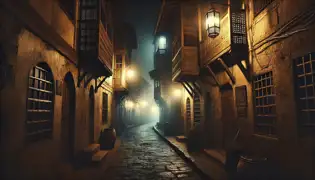
About this story: The Ghost Drummers of Mombasa is a Legend from Kenya set in the 20th Century. This Descriptive tale explores themes of Justice and is suitable for Adults. It offers Historical insights. Mombasa’s haunted past beats through the night—will the Ghost Drummers ever find rest?.
Mombasa is a city of contradictions. By day, its white-sand beaches and bustling marketplaces hum with life, but by night, the past creeps through its narrow alleys like a living thing. The old stone walls hold memories—some bright with history, others dark with secrets.
There’s an old legend whispered in the shadows of the city’s winding streets, a tale so steeped in mystery that even the most skeptical locals lower their voices when they speak of it. The story of the Ghost Drummers of Mombasa.
For centuries, sailors, fishermen, and night-watchmen have reported hearing strange, rhythmic drumming echoing through Old Town. It starts softly, like a distant heartbeat, then rises into a fierce, pounding rhythm that seems to vibrate through the very stones of the city. But when anyone dares to seek the source, the sound vanishes—leaving only silence and a chilling sense of being watched.
Most dismiss it as folklore. But in 1986, Hassan Noor, a journalist with an insatiable curiosity for the supernatural, decided to find out the truth.
What he discovered would haunt him for the rest of his life.
The Drums Begin
The first time Hassan heard the drums, it was just past midnight.
He had been sitting at his desk in his small apartment in Old Town, sifting through a pile of handwritten notes for an article on Swahili folklore. His lamp flickered, casting long shadows on the walls. Outside, the city had fallen into its usual nighttime hush—just the occasional creak of a wooden balcony in the sea breeze, or the distant cry of a stray cat.
And then, the sound came.
A deep, rhythmic thud, soft at first, but unmistakable. It rolled through the night like a slow heartbeat, measured and deliberate.
Hassan put down his pen.
Thud. Thud. Thud-thud.
His stomach clenched. It wasn’t coming from the street below. It wasn’t coming from anywhere visible.
He pushed back his chair, his pulse quickening. Grabbing his tape recorder and camera, he hurried out into the night, determined to follow the sound to its source.
The narrow alleys of Old Town were eerily silent as he moved, the ancient wooden doors closed tight against the night. The drumming continued, leading him through a winding path of white-washed buildings, their coral-stone walls whispering old secrets.
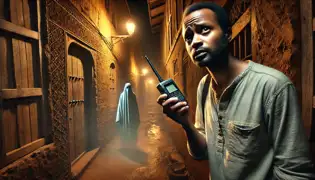
Then, as he turned a corner into an empty street—
The drumming stopped.
A heavy silence fell over the alley.
Hassan exhaled slowly, his breath loud in the quiet. He stood there, heart hammering, waiting. Listening.
A gust of wind stirred a wooden sign above him, making it creak. In the dim light, he saw a flicker of movement in the doorway of an abandoned building—a shadow shifting just out of reach.
And then, clear as day, a whisper in his ear:
“Run.”
Shadows of the Past
The next morning, Hassan went straight to his friend, Bwana Juma, an old historian who spent most of his time beneath the shade of a great baobab tree, smoking his long-stemmed pipe.
When Hassan described what he had heard, Juma's expression darkened.
"You should not have followed the sound," he said, shaking his head. "Now they know you are listening."
"Who?" Hassan asked, leaning forward.
Juma sighed, setting down his pipe. "The drummers," he said. "The lost souls of men taken from their homeland, never given a proper burial. Their spirits beat the drums because they cannot rest."
Hassan frowned. He had heard tales of the Ghost Drummers growing up—stories told by sailors and old night-watchmen—but he had never taken them seriously. Now, hearing Juma speak of them with such certainty, a shiver ran down his spine.
"Why do they still haunt the city?" he asked.
"Because they were never given peace," Juma said. "They were warriors, kidnapped from their villages, sold into slavery. Before they were loaded onto the ships, they beat their drums one last time—songs of defiance, of grief. And when the slavers tried to silence them, the heavens sent a storm, sinking the ships. The traders drowned, but the drummers… they never left."
Hassan felt a chill settle in his bones. If what Juma said was true, then the drumming wasn’t just a ghostly presence—it was a message, a story left unfinished.
And now, he had become a part of it.
Into the Depths
Determined to dig deeper, Hassan made his way to Fort Jesus, the towering fortress that had stood watch over Mombasa since the 16th century. Once a stronghold for Portuguese and Omani rulers, it had later become a brutal slave prison, its underground dungeons filled with chains that still rusted in the salty air.
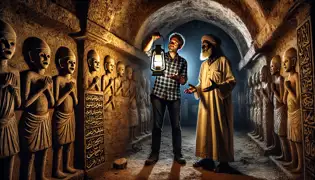
Inside the fort, he met an elderly caretaker named Omari, a man whose wrinkled face bore the weight of untold stories.
"The drums," Hassan said, his voice barely above a whisper. "Do you know where they come from?"
Omari’s eyes narrowed. He studied Hassan for a long moment before nodding.
"Come with me."
He led Hassan down a stone staircase, deeper into the fort’s underground tunnels. The air grew thick and damp, filled with the scent of old seaweed and history. At the very bottom, Omari unlocked a rusted iron gate and pushed it open.
Inside, the walls were covered in faded markings—Swahili script interwoven with Arabic. Among them was a carved image of a circle of drummers, their arms raised, their faces contorted in silent defiance.
"It is said they played until their last breath," Omari whispered. "And that their spirits still wait… for someone to finish the song."
Hassan swallowed hard.
He knew what he had to do.
The Ritual of Rest
That night, Hassan returned to the abandoned alley where he had first heard the drums. He carried with him an offering—incense, a piece of traditional Swahili fabric, and an old drum gifted to him by a village elder.
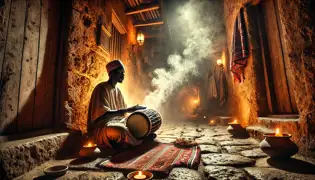
He sat cross-legged on the ground and, with trembling hands, lifted the drum.
Then, he began to play.
At first, the rhythm was uneven, hesitant. But as he continued, something strange happened—the air grew heavy, charged with an unseen energy. Shadows flickered against the walls, and the night wind whispered through the alley like a chorus of lost voices.
Then, as he struck the drum one final time—
A great silence fell.
The wind stopped. The shadows faded.
And in the stillness, Hassan felt it—the presence lifting, moving on.
The Ghost Drummers of Mombasa had finally found peace.
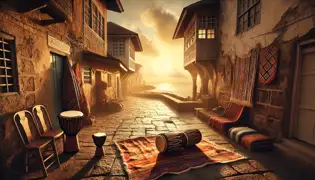
Epilogue: The Echo of Memory
The next morning, the city awoke to an unusual quiet. Fishermen who had long dreaded the eerie nighttime rhythms reported that the drums were gone.
Hassan wrote his article, but he never revealed the full details of the ritual. Some things, he believed, were meant to remain between the living and the dead.
Still, on certain nights, when the moon is high and the ocean is still, the people of Mombasa say you can hear it—a faint, distant drumming, just beneath the whisper of the waves.
A reminder that history never truly fades.


















